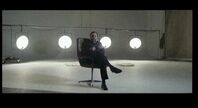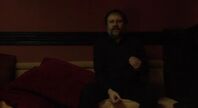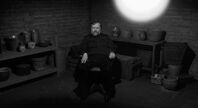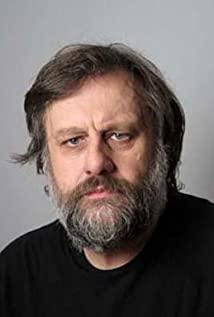Our question is not: "Are our desires satisfied?" but: "How do we know what our desires are?" There is nothing spontaneous and natural about human desires, our desires are artificial and we must be taught have desire. Movies are the ultimate perverted art. It doesn't give you what you want, it tells you how to want.
I like you, but it's not enough; I forgot, your mother invited me to dinner.
Okay, how about some ice cream?
Of course what flavor do you want
Chocolate or Vanilla?
-chocolate-okay
What we get in this wonderful segment of "Tiang Jiao Ji" is a film's commentary on the magical art of cinema with such an ordinary working-class girl living in a drab, cramped country town. Suddenly she finds herself in a situation where she is actually reproducing magical cinematic experiences. She gets to the railroad, and the train passes by as if the reality is that someone standing by a slow-passing train becomes the spectator looking at the magic on the screen.
have a drink?
Don't go in and see?
wrong go in and see
There is a very real and ordinary shot here, the inner space of the heroine. A fantasy space shot
come out. So albeit very real, the part of the train girl that she has in her mind is actually lifted to a magical level in our audience's mind. The whole shot became a dream for her. This shot is a shot in its purest form of cinematic art.
"This is the last chance and there will be no chance after that.
. Take the blue pill and the story is over. You wake up in bed and find your faith. You take the red pill and you're in wonderland... I'll show you how deep the rabbit hole is. "
But the choice of blue and red pills is not really a fantasy and a realistic choice. Of course The Matrix is
fictional machines, but these fictions make up our reality. if from our reality
Take away the symbolic fiction that controls it, and you lose reality itself.
I want a third drug. What is that? Apparently there is nothing esoteric. Pills can give us a false fast-food-like religious experience. But what this pill allows me to penetrate is not the reality after the fantasy, but the reality in the fantasy. If something is unbearable, too violent or too excited. It shatters this equivalence in reality, and we fictionalize it.
The first key point of horror fiction is that we imagine the same story, but without the horror plot, so that the context comes out. We're in the middle of Bodega Bay, where Hitchcock's "The Birds" was filmed. "The Birds" is a film about a young, wealthy, and socialite lady
She's from San Francisco and fell in love with a lad. They went to Bodega Bay together. There she found this lad
Lives with his mother. Of course I wouldn't do it, but if you bring a lady to such a place.
"Dear? - what?
I think I can handle Melanie Daniels myself
as long as you know what you want Mickey
I know exactly what I want"
And then a typical Oedipus mess. incest between mother and child. The son separates his possessive mother from the intruding girl.
- what's wrong with them?
- what happened to those birds?
-Where do you want to put your coffee?
- on the table darling
Hurry up and finish Mickey
Miss Daniels definitely wants to go back
We have a spare room upstairs with everything in it
One of the big questions in "The Birds" is stupid and obvious: "Why do the birds attack Mickey?
It can't be said that the bird is part of the real set of nature, it is more like an intrusion of a foreign object, tearing reality alive. We humans are not born in reality, we live in the space of social reality in order to be normal and interact with him. A lot of things are going to happen like we are all well equipped with a set of symbol rules and so on. Thus our sojourn in a conforming space is broken. The theory of psychoanalysis used to separate reality. The frantic blow of the bird is clearly an explosion of the maternal superego and the defense of the maternal identity. To protect sexual intercourse. So the bird is the original incestuous energy.
what am i doing? sorry
now I understand
God I'm the same as Melanie
Thoughts Do you know what I'm thinking?
:"I want to fuck Mickey"
That's what she thought.
No, I'm sorry, I'm sorry, I mean I'm suddenly disoriented, Mrs. Bates.
The cellar of our mother's house in Psycho. The most interesting thing is that the events in the special arrangement of the mother's house take place on three levels. Second floor first floor basement. This is like a replica of the three levels of human subjectivity. On the first floor: "Self" Norman is a normal son there, and here he is occupied by a normal self. The second floor is: "Superego". Mother's superego. Because the dead mother is basically a superego figure.
No mother, I go to those things up
I'm sorry kid, but you're humiliating yourself. give me an order.
- please mother
No I can't hide in the fruit cellar. Do you think I am a fruit?
In the cellar is: The id is the reservoir of illegitimate impulses. So we can explain the incident in the middle of the film. Norman dragged his mother, or as we know at the end, the mummified corpse of his mother, from the upstairs to the cellar
You can't do that next time, never go out
- i want you out baby
- i drag you away mother
It was as if he had swapped places with his mother in his mind. When his mind transitions from the superego to the id,
let me down, let me down, I can go by myself...
Of course, this is the old dogma that Freud has elaborated, that is, the superego and the id are deeply connected. The mother first complained as a majestic person: "How could you do this to me?" Don't you feel ashamed? "This is the fruit cellar" and then the mother immediately became obscene: "Do you think I am a fruit?"
The superego is not a moral force, it is an obscene force. It bombards us with impossible rules and laughs at us, and when we fail to meet its demands, it makes us more guilty the more we follow it. This is usually reflected in an obscene lunatic with superego powers. We can often find examples of psychoanalysis. It is reflected in the relationship between people, such as the comedy group "Max Brothers" Groucho, Chico and Harpo. Obviously Groucho is the most popular, his nerves are hyperactive, which stands for: "Superego".
That's going to cover a big chunk of land
That is to say, you have to circle yourself
a large piece of land
You better fuck up. I heard they're going to tear you apart and build a building where you stand.
You can hit hard, if you can't hit
You can walk away angrily. If it's too fast you'll be stuck in an hour and a minute. Do you know that when I come here, you keep talking?
Chico, the rational, arrogant, calculating guy is: "ego".
Chicolini, you are charged with treason and if convicted you will be shot
- I object - you object?
- for what reason?
- i can't think of anything else to say
objection to establishment
The oddest of them all, Harpo, a lost guy who can't speak. Freud said that impulses are inanimate. He cannot speak, of course he is: "I". Who are you guys? What are you doing in my room? This is my buddy who can't speak and is deaf. The id is fundamentally chaotic. Harpo's quirky personality lies in his childlike innocence and desire to be happy. Play like a child, children play and so on. But at the same time have something. Primal evil, always aggressive
Such absolute depravity and innocence form a unique combination. That is where the id is.
It's hard to open there, it's hard to open a table
What are you doing here?
lay down
madman - stop
put it down here
Hey do you want to break it?
- let him out
put it down here
- Mr. Klein?
- yes i am dr tanner
- how are you ? - i'm sharon
Things have gotten so bad since I called you, you better come downstairs. Is she cramping again?
- yes very powerful
Did you give her medication?
Sound is not an organ of the human body, it comes from somewhere in your body.
- mother don't
- Mrs McNeill
This is Dr Tanner
no mother no
- What happened? What happened?
- It's on fire! It's on fire!
- do something doctor please
save her!
Anytime we talk to others, there is always this ventriloquist effect. As if outside forces took over.
Let the enemy have no effect on her
Son of Evil is powerless to hurt her
your mother blowjob callas in hell
You unbelieving idiot!
Remember at the beginning of the film, this is a beautiful young girl. How did she become the monster we see now? She is possessed, but by whom?
A voice, an obscene evil raw voice. Look at the cross of God and go away. you hostile force
This is the first blockbuster film that uses this kind of broken voice, and the sound freely drifts around, which is a run-down existence. The terrifying, reality-distorting final moment or object of anxiety appears in the German Fritz Lang's 1931 film "The Will of Dr. Mabus": You and this woman will not live to get out of this house. Monster! Stop!
We don't see Mabus until the end of the film, and he's just the voice (in German) you won't live to drive this house. Redeem your son who ruled you with your life. With God the Holy Spirit, forever. Amen - merciful God hear my prayers.
The question is why there are two priests by her side.
How to deal with this invader, this foreign invader. Just like we were expecting one from Ridley Scott's Alien
Famous Fragment. The opposite sex replicates itself, as if we were just waiting for some terrifying alien, evil critter to pick out. There is a fundamental unbalanced gap between our psychic energies. Called by Freud: "Libido". This endless energy is beyond life and death, and beyond our flesh, the poor limited reality. It's not just a symptom of being possessed by a ghost, what we should know, and what the movie is trying to avoid, is that we are the opposite sex in control of our bodies. Humanity means the opposite sex that controls our animal bodies. Our Self Our spiritual power is an external energy. It's twisting and controlling our bodies, and no one really pays attention to the traumatic side of the human voice. The human voice is not a
An unusually thin medium used to express the depth of human subjectivity. Rather, it is an external intrusion. No one is better than Charlie Chaplin
more aware of this. Chaplin himself played two roles in the film, the good little Jewish barber and the evil side of this character: the dictator Heinkel. Of course it was Hitler
- please keep me away
-What's wrong…
he bit my finger
The Jewish barber is, of course, a silent film character. Silent film characters are essentially cartoon characters. They don't know about death, they don't even know about sexuality. They don't know the ordeal, they just continue their verbal self-struggle. Like the cat and mouse in the cartoon. You cut them into pieces and they regenerate. There is no limit and there is no death here. There is evil but an authentic, good evil. You are self-centered, you want to eat and beat people, but don't feel guilty. After having a sound, there is a deep inner sin and self-blame. In other words, a complex Oedipus world.
give you the henkel button
Each button has a fine engraving
The film's problem isn't just a political one, how to get rid of totalitarianism, that utterly seductive power. It's a more formal problem: how to deal with the scary voice. Or because we can't handle it simply, how to beautify
How to change this sound. Let it express human sex and so on. The German police took this poor bum, so this is Hitler. He's going to give a speech at a big rally: I'm sorry but I don't want to be a king. That's not what I want to do. I don't want to rule or conquer anyone. I would like to help anyone if possible. Jews, non-Jews, blacks, whites, we all want to help each other. That's how it is. He gave a long speech on the need for mutual understanding of love. But there is a point, even two. The soldiers united in the name of democracy! People applauded in the same way that they applauded Hitler, and the music that accompanies the curtain call of this great humanitarian is the prelude to Wagner's opera Lohengrin. Just like what we heard when Hitler was daydreaming. He fantasizes about conquering the world, and he has a balloon in the shape of a globe. The music is the same, which can be read as the final application of music. Music that serves evil can also serve good. Or it can be read as, I think, in a more obscure way, through music, we can no longer be sure that because it externalizes our inner passions, music has always been a potential threat.
There's a short scene in David Lynch's "Mulholland Drive." It happened in this theater where we were standing. Here's a woman singing behind the microphone. And then because of fatigue or something, she collapsed. Surprisingly, the singing continued. It was soon explained that it was a rewind. But just when we doubted
Those quarters of hours... we encountered a nightmarish phenomenon of partial self-releasing of objects. Like "Alice in Wonderland"
The Cheshire cat in the famous adventure, the cat disappeared and the smile is still there. You may have noticed that I'm not all here
The lost green pig whimpered, the interesting thing about local objects is that they make you feel like you have no body
local organs. This reflects Freud's "death drive". Here we are very careful, "death drive" is not the kind of thing that Buddhists pursue death "I want to find eternal peace. I want to..." No. "Death Drive" is pretty much the opposite of that, "death drive" is the kind of stuff in a Stephen King horror novel. To be made the undead, the living dead, the dimension in which something is alive after it dies. It can also be said to be immortal, to persist and persevere, you cannot destroy it. The more you have to let it go, the more persistent it is, it will continue this kind of thing. Some kind of demon-infested immortality is what the local objects are meant to reflect. One of the best examples in my opinion is Mitchell Powell's
"Red Lingyan". It's about a ballerina girl whose motivation to dance comes from a pair of shoes that control her feet. This shoe can be understood as an undead thing, perhaps the last limb suitable for the role of this local autonomous object will be a fist or even a palm. The raised hand is what the whole film is going to reflect, for him it's not a simple external thing, it's his personality there
the core part.
Safe? I'm Jack's Avenger
What the hell are you doing? It hurts.
This shot is not at all a perverted fantasy of perverted masochism or violence. It has profound liberating meanings. I'm right here, Riot's side, I think that's what liberation is all about. In order to hit the enemy, you first have to beat yourself up, and deal with yourself the things that keep you in slavery by your superiors.
Don't stop!
What are you doing?
God no no no!
For some reason I remembered the first bout with Taylor/There was always a conflict between the two of me. fuck you! you hit me in the ear - god sorry
- God! Why are you hitting me in the ear?
- i made a mistake
No, great.
As if the other self was the self but not the "castrated" self
There is a classic period in the history of British horror movies, "Night of the Dead".
I know you won't be hard on me
Hugo
I know you'll be back
The film stars Michael Redgrave as a ventriloquist who is jealous of his puppets.
Don't get excited I'm just kidding, you know my Markwell!
Markwell!
Markwell! Get your hands off!
Stop playing! - Markwell!
this fool!
Officer, hurry up, open the door, hurry up
This is an outbreak of violence. He destroyed the puppet and smashed it into pieces. In the last shot of this video, I saw him in the hospital, slowly regaining consciousness. At first, his voice got stuck in his throat, and after a lot of effort, he could finally speak, but it was a dumb, twisted voice.
Hey Sylvester, I've been waiting for you
The meaning is obvious, the only way to solve the local self-release of an object is to become this object.
let me know when you're ready
- ok i'm ready
Wait a minute so I don't confuse them
Where are my keys?
in this in this
Well, if you have something to do, you can ask me to stand on this balcony. A murder happened here.
This is where the murder scene in "The Conversation" takes place.
The private detective watched through this dirty glass in front of me. The detective is in a room nearby, it's worth noting that
It was before the murder that he observed the balcony through a crack in the glass wall. Every time we come across this famous classic "Voyeur" shot where someone looks through the crack to see something horrific, it's never that we're treating the two parts, the ends of the wall, as
the same reality. Before seeing anything, or imagining seeing something, he would try to listen and act like an eavesdropper. With his private detective stuff. How does this affect him? Potentially at least it makes him a curious, fanciful "object"
I can't take it anymore, I can't take it anymore, you're going to make me cry.
I know darling, me too
no no - i don't understand
what are you saying
He is not curious about the murder scene, he is interested in himself. As a witness to the murder, he saw in that filthy window glass, a valid touch screen, even a movie screen. This can be considered as a crazy attempt to draw and even fantasize about the reality of what I have heard.
-Hey baby-shut up! It's "Daddy" you idiot!
Where is my bourbon?
Dorothy's apartment is hell, full of David Lynch movie vibes where moral or social repression seems to be on hold. Everything is possible, the lowest level of masochistic obscenity, deep desires, desires that we are not ready to admit, are all encountered in this place.
Open your legs, open more, show me. fucking look at me.
From which angle are we going to look at this lens?
Imagine a scene, a small child, hiding in a closet or behind a door. Seeing his parents making love, he still doesn't know what sex is and how to make love. All he knew was listening to this strange gasp. Then he wanted to know what happened. At the very beginning of Blue Velvet we see Jeffrey's father falling to the ground with a heart attack. The usual patriarchy has declined.
hi dad
oh mom mom
Mother
- mom loves you
-The kid wants to fuck you!
Jeffrey seems to be fantasizing that the wild couple Dorothy and Frank are a fantasy complement to true patriarchy.
Ready
You idiot! idiot!
don't fucking look at me!
Frank not only acted, but exaggerated. It seems that his ridiculously exaggerated body language, yelling, etc. to cover up something, the key is of course also basic persuading the invisible observer. My father was trying to hide something important, so this second way of looking at the set can be seen as a spectacle. A spectacle of ludicrous violence, set up by a father convincing his son of his powers, his superpowers.
A third approach focuses on Dorothy itself. Many women emphasized the violence against women in the scene, abused the role of Dorothy, how abused, of course, there is a measure. But I think it's time to take the plunge and try a more shocking positive explanation. If it's the central question, what's the problem with Dorothy's passivity in the scene?
Don't you fucking look at me! What is Frank's doing, what's a crazy absurd but proven way to wake Dorothy up and bring her back to life? So if Frank is considered a fantasy, he must be Dorothy's
fantasy. Not only ambiguous but also wobbly between the three focal points, which I think is the reason for the strange reflections on set. This brings us to the third, perhaps crucial example, the best scene for me in Vertigo
We see Scottie peeking at Tom's location. Looking through a fissure, it was as if Marlen was really there. When Marlen peeps at her from a mysterious gap, from a murky underworld, this is where the fantasy gaze is conceived. The gaze is a hazy little blind spot, the camera shifts from the subject to the gaze, after suspecting a murder in a nearby hotel room, Jane Hackman plays a private investigator who enters the room and checks the bathroom, as he walks into the bathroom inside the bathroom , obviously we feel Hitchcockian horror. Some kind of strong suggestive psychological dialogue is taking place in a very violent posture. As if adopting the role of Norman Bates' mother, psychological murder.
He opened the curtains and examined it carefully, looking for bloodstains there, and even checking for gaps and leaks in the bottom of the sink. It's precisely these focal points, the other of the subject's eyes that fades out of view due to that hole in the psyche and morphs into a return-gazing eye. We say that the eyes are the windows to the soul. But what if there were no minds behind the eyes? What if the eyes were a slit through which we saw the dark world?
View more about The Pervert's Guide to Cinema reviews







